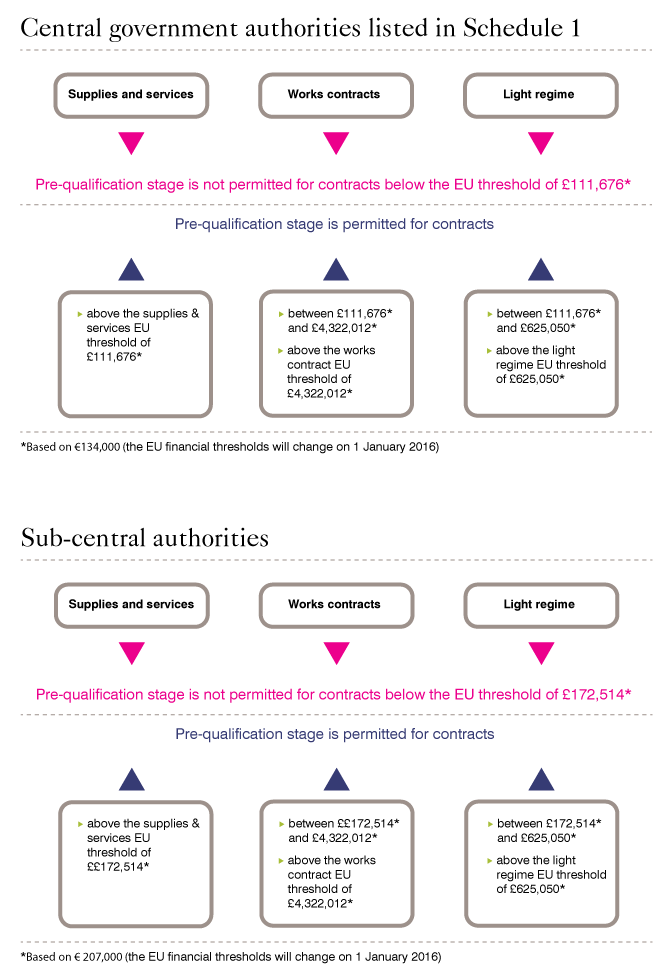18/03/2015
|
In Procurement Byte 15 we let you know that the Public Contracts Regulations 2015 were published on 5 February 2015, with most of the provisions coming into force on 26 February 2015. We also mentioned that the main difference between the draft Regulations issued in September 2014 and the final published Regulations concern the “national” rules. These rules, in Regulations 105 to 114, implement reforms proposed by Lord Young, primarily aimed at encouraging SME participation in public procurement processes. It is important to understand that new national rules apply to both EU contracts and contracts below the EU thresholds. In particular there are new national rules on:
We have divided this Byte 18 into 2 Parts which we are issuing at the same time but as two separate documents:
|
Overview
- Regulation 111 abolishes the pre-qualification stage for low value contracts and introduces new provisions on suitability assessment questions.
- Regulation 111 applies to:
-
- Contracts for works, supplies,services and light regime services below the relevant supplies and services treshold;
- Procurements commencing on or after 26 February 2015; but
- Does not apply to the procurement of healthcare services within the scope of the NHS (Procurement, Patient Choice and Competition) (No. 2) Regulations 2013.
So when is the pre-qualification stage abolished?

(NB: The value of contracts is calculated in accordance with the usual rules on thresholds and aggregation and excludes VAT.)
General Principle
Regulation 111(1) states that "A contracting authority shall not include a pre-qualification stage in a procurement".
What does this mean?
Pre-qualification stage is not permitted:
Regulation 111(4) explains that a "pre-qualification stage" means a stage in the procurement process during which the contracting authority assesses “the suitability of candidates to perform a contract for the purpose of reducing the number of candidates to a smaller number who are to proceed to a later stage in the process”.
This appears to prevent any form of pre-qualification or suitability assessment process. However, in practice, contracting authorities are able to undertake a limited assessment by asking candidates to answer “suitability assessment questions”.
Suitability assessment questions are permitted:
These can only be asked where a number of conditions are met:
Suitability questions must be
- relevant to the subject matter of the procurement; and
- proportionate
and contracting authorities may only use the information and evidence requested in suitability assessment questions to establish whether candidates meet requirements or minimum standards of suitability, capability, legal status or financial standing. All candidates meeting the requirements and minimum standards must be invited to tender.
This means that it is not possible to draw up a shortlist of the best qualified candidates from amongst those who meet the minimum standards.
The Crown Commercial Service has published a note: Public Contracts Regulations 2015 Lord Young Reform Frequently Asked Questions.
The FAQs include questions and answers on Contracts Finder, Prompt Payment, PQQs for contracts over the EU threshold and abolition of PQQs for below threshold procurements. One of the FAQs on abolition of PQQs for below threshold procurements summarises the position:
FAQ 16
"Can I still assess supplier suitability during a below OJEU Procurement?
You can assess supplier suitability as part of your invitation to tender or include suitability requirements in your advert. What you must not do is to use a PQQ, a PQQ stage or any other pre-tender selection process to pre-qualify (or reduce the number of suppliers) to be invited to tender, when procuring goods or services and you must not impose arbitrary minimum requirements which may have the unintended effect of barring new businesses from bidding. For example, if you choose to evaluate a supplier’s financial standing you should not rule out a supplier unless there is clear evidence that the supplier’s financial position places public money or services at unacceptable risk.
As part of your ITT you may:
- Apply the “pass/fail” mandatory and discretionary criteria as set out in Clause 23 of the Public Contracts Regulations 2006.
- Undertake a financial check. This should be conducted in line with the general principles set out in PPN 02/13 supplier financial risk issues.
- Where the capability of an individual is essential to the delivery of the contract, for example, the provision of consultancy, CVs or references may be requested to assure the credibility of delivery as part of assessing quality at the award/ITT stage.
For consistency, if you wish to assess supplier suitability as part of an ITT/ITQ, you should pick from the bank of questions contained in the supplier suitability check."
FAQ 17
Confirms that contracting authorities may continue to use the industry standard PAS91 for works contracts that are above the EU thresholds for supplies and services.
Guidance to be issued by the Minister for the Cabinet Office and reportable deviations Regulations 111(7) to (9)
Contracting authorities are required to have regard to any guidance issued by the Minister for the Cabinet Office. This may include guidance on how to establish and assess whether candidates meet requirements or minimum standards without infringing the principles of relevance and proportionality.
Where a contracting authority runs a process which involves using a “reportable deviation” from criteria specified in the guidance, then it must send a report explaining the deviation to the Cabinet Office. It is not currently clear what the consequences of a reportable deviation will be.



